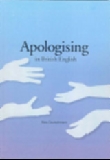hsvkat:504 mat:dok (lärosäte:(gu) OR lärosäte:(du) OR lärosäte:(kau) OR lärosäte:(lnu) OR lärosäte:(ltu) OR lärosäte:(lu) OR lärosäte:(miun) OR lärosäte:(mdh) OR lärosäte:(su) OR lärosäte:(umu) OR lärosäte:(uu) OR lärosäte:(oru))
Search: hsvkat:504 mat:dok (lärosäte:(gu) OR lärosäte:(du) OR lärosäte:(kau) OR lärosäte:(lnu) OR lärosäte:(ltu) OR lärosäte:(lu) OR lärosäte:(miun) OR lärosäte:(mdh) OR lärosäte:(su) OR lärosäte:(umu) OR lärosäte:(uu) OR lärosäte:(oru)) > Umeå University > Apologising in Brit...
- 2 of 194
- Previous record
- Next record
- To hitlist
Apologising in British English
-
- Deutschmann, Mats, 1964- (author)
- Mittuniversitetet,Umeå universitet,Moderna språk,Institutionen för humaniora (-2013)
-
- Poussa, Patricia, Professor (thesis advisor)
- Umeå universitet,Institutionen för språkstudier
-
- Nevalainen, Terttu, Professor (opponent)
- Department of English, Helsingfors universitet, Finland
- (creator_code:org_t)
- ISBN 9173054178
- Umeå : Umeå universitet, 2003
- English 262 s.
- Series: Skrifter från moderna språk, 1650-304X ; 10
- Doctoral thesis (other academic/artistic)
Abstract
Subject headings
Close
- The thesis explores the form, function and sociolinguistic distribution of explicit apologies in the spoken part of the British National Corpus. The sub-corpus used for the study comprises a spoken text mass of about five million words and represents dialogue produced by more than 1700 speakers, acting in a number of different conversational settings. More than 3000 examples of apologising are included in the analysis.Primarily, the form and function of the apologies are examined in relation to the type of offence leading up to the speech act. Aspects such as the sincerity of the apologies and the use of additional remedial strategies other than explicit apologising are also considered. Variations in the distributions of the different types of apologies found are subsequently investigated for the two independent variables speaker social identity (gender, social class and age) and conversational setting (genre, formality and group size). The effect of the speaker-addressee relationship on the apology rate and the types of apologies produced is also examined.In this study, the prototypical apology, a speech act used to remedy a real or perceived offence, is only one of a number of uses of the apology form in the corpus. Other common functions of the form include discourse-managing devices such as request cues for repetition and markers of hesitation, as well as disarming devices uttered before expressing disagreement and controversial opinions.Among the speaker social variables investigated, age and social class are particularly important in affecting apologetic behaviour. Young and middle-class speakers favour the use of the apology form. No substantial gender differences in apologising are apparent in the corpus. I have also been able to show that large conversational groups result in frequent use of the form. Finally, analysis of the effects of the speaker-addressee relationship on the use of the speech act shows that, contrary to expectations based on Brown & Levinson’s theory of politeness, it is the powerful who tend to apologise to the powerless rather than vice versa.The study implies that formulaic politeness is an important linguistic marker of social class and that its use often involves control of the addressee.
Subject headings
- HUMANIORA -- Språk och litteratur -- Studier av enskilda språk (hsv//swe)
- HUMANITIES -- Languages and Literature -- Specific Languages (hsv//eng)
- SAMHÄLLSVETENSKAP -- Sociologi (hsv//swe)
- SOCIAL SCIENCES -- Sociology (hsv//eng)
- HUMANIORA -- Språk och litteratur -- Jämförande språkvetenskap och allmän lingvistik (hsv//swe)
- HUMANITIES -- Languages and Literature -- General Language Studies and Linguistics (hsv//eng)
Keyword
- English language
- apology
- speech act
- politeness
- Brown & Levinson
- power
- solidarity
- sociolinguistic variation
- pragmatics
- BNC
- corpus linguistics
- British English
- Engelska
- English language
- Engelska språket
- engelska
- English
- Other Germanic languages
- Sociology
- Linguistic subjects
Publication and Content Type
- vet (subject category)
- dok (subject category)
Find in a library
- Apologising in British English (Search the publication in LIBRIS)
To the university's database
- 2 of 194
- Previous record
- Next record
- To hitlist
Find more in SwePub
- By the author/editor
- Deutschmann, Mat ...
- Poussa, Patricia ...
- Nevalainen, Tert ...
- About the subject
-
- HUMANITIES
- HUMANITIES
- and Languages and Li ...
- and Specific Languag ...
-
- SOCIAL SCIENCES
- SOCIAL SCIENCES
- and Sociology
-
- HUMANITIES
- HUMANITIES
- and Languages and Li ...
- and General Language ...
- Parts in the series
- Skrifter från mo ...
- By the university
- Örebro University
- Umeå University
- Mid Sweden University
Search outside SwePub
- Extend your search to:
- Google Book Search
- Google Scholar
Kungliga biblioteket hanterar dina personuppgifter i enlighet med EU:s dataskyddsförordning (2018), GDPR. Läs mer om hur det funkar här.
Så här hanterar KB dina uppgifter vid användning av denna tjänst.
- Copyright © LIBRIS - National Library Systems
- LIBRIS.kb.se

